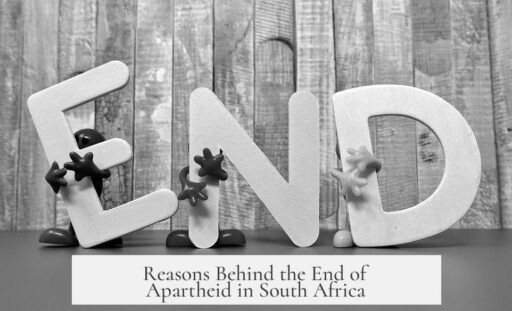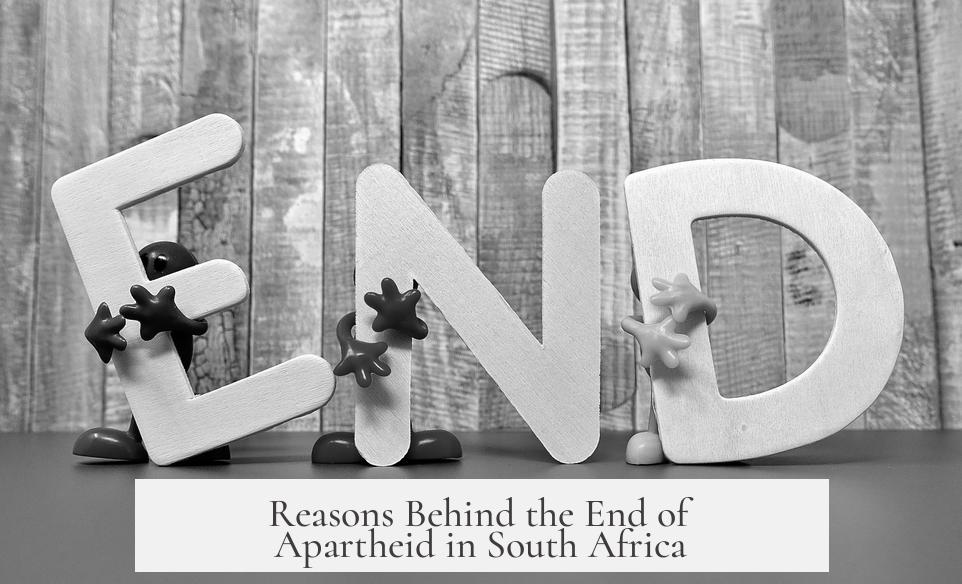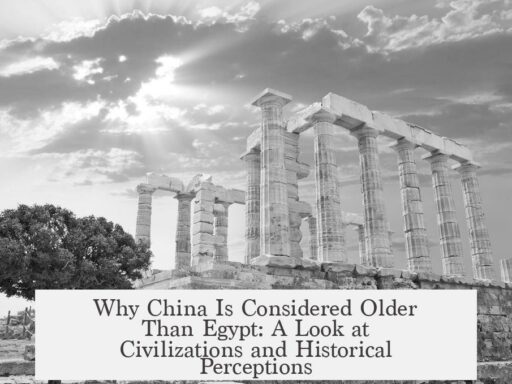Apartheid in South Africa ended due to a complex interplay of internal resistance, international pressure, economic challenges, political reform, and geopolitical shifts, especially the end of the Cold War. Decades of activism from Black South Africans, combined with growing global condemnation and economic sanctions, significantly weakened the apartheid regime. The political leadership under F.W. de Klerk initiated legal changes, which paved the way for democratic elections and Nelson Mandela’s release. Additionally, the collapse of the Cold War removed the apartheid government’s anti-communist justification, reducing Western support. Each of these factors contributed decisively to apartheid’s demise.
Decades of internal resistance formed a core element in apartheid’s downfall. Black South Africans continuously challenged the system through protests, boycotts, and riots. Organizations like the African National Congress (ANC) and the Pan Africanist Congress (PAC) led political campaigns despite being outlawed from 1960. Leaders such as Nelson Mandela became global symbols of resistance while imprisoned. Activism inside and outside South Africa, including exiled leaders coordinating efforts abroad, created sustained pressure on the regime.
International condemnation and sanctions further isolated apartheid South Africa. Following the 1960 Sharpeville Massacre, where police killed 69 unarmed protesters, the United Nations condemned apartheid and called for sanctions. Grassroots movements across Europe and the U.S. successfully lobbied governments to impose economic and cultural sanctions. By the mid-1980s, major multinational corporations withdrew investments, damaging South Africa’s economy. The passage of the Comprehensive Anti-Apartheid Act by the U.S. Congress in 1986 formalized these pressures, causing economic strain and diplomatic isolation.
The apartheid regime’s economic difficulties worsened in the 1980s. Sanctions and internal unrest drained resources, while South Africa’s costly military involvement in neighboring Namibia intensified financial burdens. The government’s economic decline weakened its ability to maintain oppressive structures and military dominance. The strain contributed to a greater willingness among some white South Africans and political leaders to consider negotiated reforms.
Political transformations under President F.W. de Klerk marked a turning point. In the early 1990s, de Klerk repealed apartheid laws, legalized banned liberation movements like the ANC, and released Nelson Mandela after 27 years in prison. He allowed freedom of the press and paved the way for democratic elections. These reforms led to the 1994 election in which Mandela became South Africa’s first Black president. De Klerk’s decisions created the political framework for peaceful transition to majority rule.
The global end of the Cold War also undermined apartheid’s ideological defense. During the Cold War, the apartheid regime portrayed itself as an anti-communist bastion in Africa, securing tacit international support from Western powers fearful of communist expansion. Liberation movements were branded as communist threats to justify oppressive policies. However, once communism declined internationally, this rationale lost credibility. The 1988 withdrawal from Namibia and Cuba’s pullout from Angola showed shifting geopolitical realities. Consequently, Western governments retracted support, and anti-apartheid forces gained stronger legitimacy.
U.S. policy evolved significantly over apartheid’s course. Initially, U.S. administrations tolerated apartheid governments for their strategic anti-communist stance. Yet, by the 1980s, the U.S. Congress took a firm stance against apartheid, passing sanctions legislation. After South Africa committed to democratic reforms, the U.S. lifted sanctions and increased aid, signaling strong support for the new democratic South Africa and encouraging foreign investment.
| Key Factors | Details |
|---|---|
| Internal Resistance | Long-term protests, ANC and PAC activism, international anti-apartheid campaigns, Mandela’s leadership |
| International Pressure | UN condemnation in 1962, sanctions by Western nations, cultural and economic boycotts, global activism |
| Economic Strains | Declining economy due to sanctions, military expenses, corporate disinvestment |
| Political Reform | De Klerk’s repeal of apartheid laws, Mandela’s release, democratic elections in 1994 |
| Cold War End | Loss of apartheid’s anti-communist justification, regional military agreements, decreased foreign support |
| U.S. Policy | From tacit early support to sanctions in 1986, followed by aid post-apartheid reforms |
The role of individuals such as Nelson Mandela complements broader structural changes but does not solely explain apartheid’s end. While Mandela embodied resistance and reconciliation, scholarly debate emphasizes the importance of social forces, economic realities, and international shifts driving the system’s collapse. Thus, apartheid’s ending results from interwoven factors, not a single cause or figure.
- Internal activism and uprisings undermined apartheid’s legitimacy over decades.
- International sanctions and global condemnation isolated South Africa economically and politically.
- The apartheid economy declined due to sanctions and military commitments.
- Reformist leadership under de Klerk dismantled apartheid legislation and facilitated negotiations.
- The Cold War’s end removed South Africa’s anti-communist rationale, reducing Western support.
- U.S. policy shifted from tolerance to sanctions, then support for democracy post-apartheid.
Why did the apartheid regime use anti-communist rhetoric?
The regime claimed to fight communism to gain Western support during the Cold War. However, apartheid was mainly about maintaining white supremacy through racial segregation, not truly opposing communism.
How did the end of the Cold War affect white South Africans’ view on apartheid?
White South Africans feared a communist takeover linked to black liberation movements. When communism declined globally, some white fears lessened, softening resistance to majority rule.
Did Nelson Mandela alone end apartheid?
Mandela played a significant role but apartheid ended due to many factors. Long-term activism, international pressure, and social forces all contributed, not just individuals.
What role did international pressure play in ending apartheid?
Global outrage after events like the Sharpeville Massacre led to UN sanctions and economic boycotts. These actions isolated South Africa economically and diplomatically, pushing for change.
How important was internal resistance to ending apartheid?
Decades of protests, strikes, and activism by Black South Africans challenged apartheid from within. This ongoing resistance weakened the regime and inspired global support for change.



